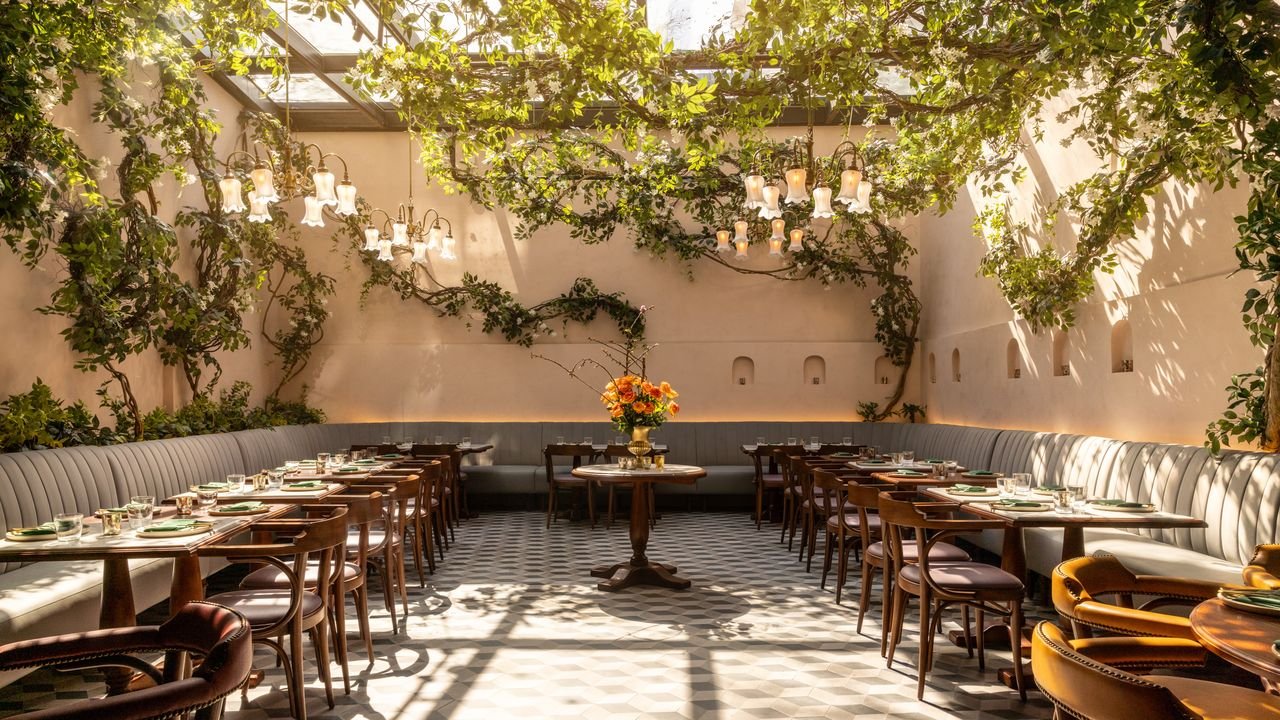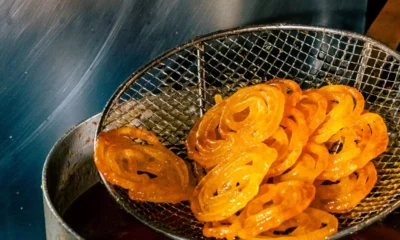Solo Travellers
12 Fantastic Indian Restaurants in NYC

Tamarind Tribeca
Chef-owner Avtar Walia has been something of a trailblazer in the New York City Indian dining landscape, ever since he convinced culinary doyenne and actress Madhur Jaffrey to open Dawat in 1986 in Manhattan. Since 2001, he’s been the force behind Tamarind, a Tribeca institution that revolutionized the approach to Indian fine dining in New York. The tasteful interiors are an elegant backdrop to refined dishes like lobster masala, prawn curry, and Nizami kheema. There may be no shortage of trendy new openings in the city these days, but Tamarind’s staying power speaks for itself.
Vatan
I could tell you about this Murray Hill fixture, but some things just need to be seen to be believed. The Third Avenue façade doesn’t begin to prepare you for what lies within: My jaw hit the floor when I walked into the unexpectedly cavernous dining room modeled after a traditional Gujarati village, complete with faux trees, thatched-roof booths, murals of pastoral Indian vignettes, and a massive Ganesh statue presiding over it all. Make sure you get comfortable in your booth because you’re unlikely to leave anytime soon: Vatan’s prix-fixe $45 vegetarian menu is an all-you-can eat bonanza. A massive thali is regularly refreshed with samosas, sev puris, bhaji, daal, chole, and much more on demand, plus endless ice cream and gulab jamun if you make it that far. Between the endless food and the quirky interiors, this is a place you’ll want to settle into for a while.
Dhamaka
Dhamaka means explosion, and that’s exactly how this colorful Lower East Side spot landed in New York in 2021. The Unapologetic Foods takeover of New York’s Indian restaurant scene may have begun with Adda (originally in Long Island City and recently transplanted to the East Village) and cemented with Semma, but it’s when Dhamaka opened that I first realized that Indian food enthusiasts in the city were in the throes of a culinary zeitgeist. Restaurateur Roni Mazumdar and chef Chintan Pandya were the first team brazen enough to make food exactly how they wanted it, without dialing back ingredients (goat kidney and testicles, anyone?) or spice levels to cater to Western palates. The result was an instant hit with Indian diners eager for authentic flavors beyond butter chicken, and guided everyone else to push their boundaries and expectations of what Indian flavors could taste like. It may have inspired a legion of other restaurants to follow in its footsteps, but Dhamaka, with its colorful interiors and banging Bollywood soundtrack, is always a winner.
Brooklyn
Lore
I’m not sure why Lore isn’t one of the hardest-to-get reservations in New York, but at least that means chef Jayesh Kumar’s Park Slope spot has managed to retain its neighborhood charm—for now. Get there ASAP to try Kumar’s inventive menu, that leans on his South Indian roots and European training (he spent decades in Switzerland before opening Lore in 2022), and like me, you’ll be wondering what kind of a mad genius thought up unlikely mash-ups like roti ravioli, kimchi uttapam, and a steak au poivre with masala butter and fries. Kumar also recently launched a dosa stand at Smorgasburg, and will be opening a bar called Folk (get it?) in Park Slope later this summer—with creative globally inspired cocktails and clever small plates like biryani arancini on the menu.
Indian Table
With its distinctive tangy flavor profiles and heady Portuguese influence, the cuisine of the tiny western state of Goa is unlike any other in India—but it can be hard to come by in the city, aside from appearances by vindaloos or the occasional poee bread on menus. But when I’m missing Goa’s famous susegad—laid-back—way of life, I make my way to Cobble Hill’s Indian Table, where Goan chef Eric McCarthy guides diners through a deep dive through classics from his home state: think chicken cafreal, ros omelette, and pork sorpotel, and plenty of coastal classics like the kalchi kodi fish curry and crab cutlets. The dining room, clad in Portuguese-style tiles, is cozy, but when the weather is sultry you’ll want to grab a seat on the back patio stung with fairy lights and feel transported to a veranda in Assagao.
Queens
Angel Indian Restaurant
It’s hard to play favorites in Jackson Heights—you could eat well in this multicultural hub brimming with Indian, Pakistani, Bangladeshi, and Nepali restaurants for weeks without ever going back to the same spot twice. Angel, however, merits many a return. It’s been a local hit ever since it opened in 2019 (Bungalow chef Vikas Khanna is a big fan), with everything from a standout take on the all-too-familiar butter chicken to dishes like lotus root kofta that are rarer to spot on New York menus, plus plush naans you’ll want to swathe yourself in. But the star here is the dum biryani—in vegetarian, chicken, and goat varieties—that comes shrouded beneath a crust of bread. When the server carves it open to mix the layers together and releases wisps of steam that linger over your table, that’s your signal to feast.
Note: The space may feel a bit snug, but the owners just opened a second, sleeker location not too far away from the original.
Raja Sweets and Fast Food
Feeling snack-y? This Jackson Heights vegetarian joint is something of an institution for its dizzying array of fried treats and chaat, those textural flavor bombs that are the perfect union of savory, sweet, crunchy, and tangy. Start with some samosas and pakoras, then chase orders of sev puri, papri chaat, and aloo bhatura with refreshing mango lassi and lemon soda water. But if you’re thinking about satisfying your chaat cravings during a heat wave like I did recently, calibrate your order based on how much spice you can handle under a handful of lazily whirring fans.
Hindu Temple Canteen
You’d never guess from the outside that the majestic Ganesh Temple in Queens houses a basement canteen serving some of the city’s most authentic South Indian cuisine. Since 1993, the Temple Canteen has perfected South Indian staples like pillowy idlis, crispy dosas, and thick, buttery uttapams—all best dunked in a silky coconut chutney. The ghee pongal (rice and lentils with clarified butter) is gentle and hearty, a regular on my takeaway rotation. It’s a no-frills spot where bustling aunties keep the weekend crowds flowing efficiently while massive dosas sail past, stuffed with everything from classic potato masala to more adventurous paneer fillings. My weakness? The Pondicherry dosa—a triangular beauty spread with spicy chutney and a savory mixture that delivers serious heat. Paired with piping hot Madras tea, sweetened with enough sugar to temper the spice in the best possible way. —Pallavi Kumar
Solo Travellers
Social Spotlight: Women Travel Solo – FOX 13 Tampa Bay

Social Spotlight: Women Travel Solo FOX 13 Tampa Bay
Source link
Solo Travellers
Costa Rica’s nine-course meal in the sky

He handed over a San Lucas “passport”, which included another map of the country with background about each province, and opened the suitcase to reveal an adventurous assortment of appetisers: taro root chips; a cocoa butter sphere containing agua de sapo (a drink made with sugar cane, lime and ginger); mushroom-shaped butter; and a shot of chicheme (a traditional Indigenous fermented purple corn drink).
Over the next two hours, Marenco presented a nine-course tasting menu, each dish paying homage to a different province. With each course, he added insight – from local dish nicknames to stories of how geography shaped cuisine – enriching the menu with personal and cultural context.
I’d requested the vegetarian menu and began my journey with a punchy ceviche made with green apple and chayote – an alternative to the fish and piangua (black-shelled molluscs) dish – that represented Puntarenas, the province with the longest Pacific coastline. A crispy quinoa croquette atop a delicate coconut milk foam arrived at dusk, the sauce’s spicy, aromatic flavours inspired by Limón, Costa Rica’s Caribbean province. Cartago was depicted with a smoky potato dish – the province’s main agricultural product – topped with “ash” made from burnt onion powder, referencing its volcanic landscape.
San Lucas opened in 2019, but the project was years in the making. Valverde consulted with multiple experts, including Alejandra Brenes, a psychologist who specialises in gastronomic consumer behaviour and the neuroscience of sensory experiences. For San Lucas, she researched how people react to different stimuli in order to curate the experience for diners and generate curiosity. “For example, temperature, the choice of plates, the way the food is placed on them, the music, the dish’s texture, it all affects our perception of flavour,” she said, describing the end result as “a small gastronomic adventure park”.
More like this:
• Trekking Costa Rica’s wildest trails
Solo Travellers
Love Travelling Solo? You Have These 9 Personality Traits, According To Psychology – Times Now
-

 Brand Stories2 weeks ago
Brand Stories2 weeks agoBloom Hotels: A Modern Vision of Hospitality Redefining Travel
-

 Brand Stories1 week ago
Brand Stories1 week agoCheQin.ai sets a new standard for hotel booking with its AI capabilities: empowering travellers to bargain, choose the best, and book with clarity.
-

 Destinations & Things To Do2 weeks ago
Destinations & Things To Do2 weeks agoUntouched Destinations: Stunning Hidden Gems You Must Visit
-

 Destinations & Things To Do1 week ago
Destinations & Things To Do1 week agoThis Hidden Beach in India Glows at Night-But Only in One Secret Season
-

 AI in Travel2 weeks ago
AI in Travel2 weeks agoAI Travel Revolution: Must-Have Guide to the Best Experience
-

 Brand Stories1 month ago
Brand Stories1 month agoVoice AI Startup ElevenLabs Plans to Add Hubs Around the World
-

 Brand Stories4 weeks ago
Brand Stories4 weeks agoHow Elon Musk’s rogue Grok chatbot became a cautionary AI tale
-

 Asia Travel Pulse1 month ago
Asia Travel Pulse1 month agoLooking For Adventure In Asia? Here Are 7 Epic Destinations You Need To Experience At Least Once – Zee News
-

 AI in Travel1 month ago
AI in Travel1 month ago‘Will AI take my job?’ A trip to a Beijing fortune-telling bar to see what lies ahead | China
-

 Brand Stories2 weeks ago
Brand Stories2 weeks agoContactless Hospitality: Why Remote Management Technology Is Key to Seamless Guest Experiences














You must be logged in to post a comment Login